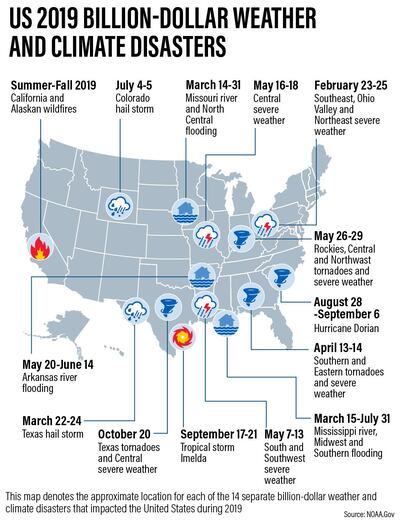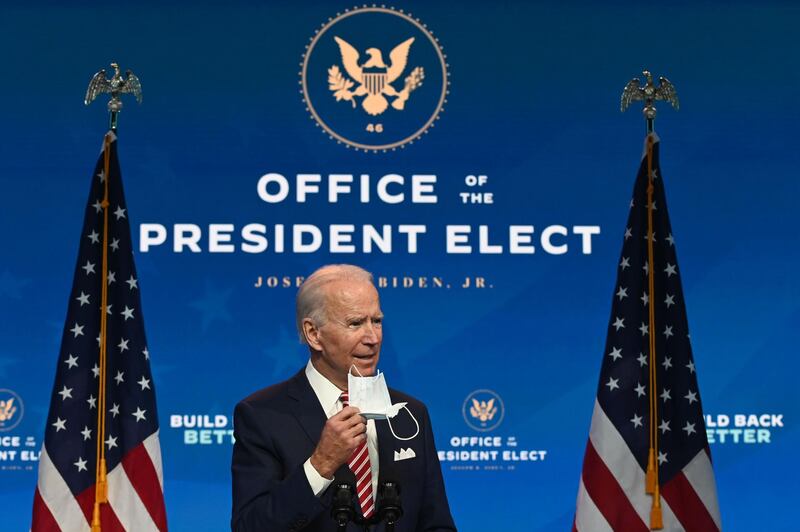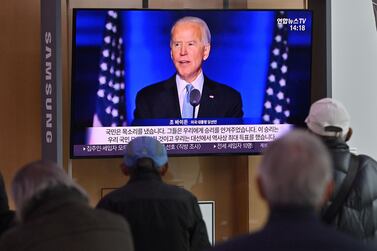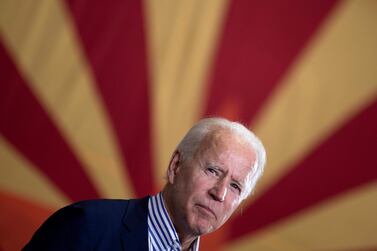With just two months to assume office, President-elect Joe Biden is fine-tuning policy as he looks to deliver on key campaign promises, particularly those focused on energy.
No doubt the immediate task of the Biden administration will be to contain the Covid-19 pandemic and focus on reviving the world’s largest economy.
In parallel, Mr Biden is also keen to rush through some critical green policies as he looks to set a tone that is vastly different to that of his predecessor. In a symbolic move, the US is set to re-join the Paris Agreement that aims to limit global warming on the first day of Mr Biden's presidency. The US formally exited the accord on November 4 under the Trump administration.
A key component of Mr Biden's policy is a pledge to invest $2 trillion in clean energy across various sectors. However, with US public debt rising exponentially, many domestic energy companies bankrupt or close to it, and the Senate likely to fall under Republican control, it's unclear how much of Mr Biden's green transition goals will be achieved by the end of his term in 2024.
Much of the President-elect’s campaign promises will depend on the make-up of the Senate next year, according Greg Priddy, an independent political risk consultant based in Washington DC.
The high-stakes Senate run-off elections in Georgia, a traditionally Republican state, which flipped for Mr Biden during the presidential election, is key to enacting future green legislation under the new administration.
“Passing really substantive legislation would require that they win those two Senate seats in Georgia. That's really an important fulcrum,” Mr Priddy said.
"If there's a 50-50 Senate, then Kamala Harris as the vice president breaks the tie and the majority leader would end up being Chuck Schumer,” he added. Mr Schumer currently serves as minority leader in the Senate.
The US' rejoining of the Paris Agreement will strike a chord with young Americans who have have become increasingly vocal about racial discrimination and protecting the environment. Around 60 per cent of Americans are concerned about climate change, according to a Pew Research poll conducted in 2020, compared with around 44 per cent in 2009.
The same survey found 88 per cent of Democrats consider climate change as a threat in 2020, compared with 31 per cent of Republicans.
Natural disasters, such as hurricanes, which impact traditionally Republican states, as well as fires in typically Democratic states like California, have also had an impact on the narrative around climate-friendly policies. The financial impact of such disasters on the US economy is staggering and it is highly likely that the Biden administration will act on.
The total approximate cost of damage from weather and climate disasters in the US from 1980 to 2019 is estimated at $1.75tn, according to official country data. The cumulative costs of the 16 separate billion-dollar weather events in the US in 2017 was $306.2bn, the highest ever.

The challenge for the Biden administration is to pursue green policies in a country that is the world's largest producer of hydrocarbons.
Crude production reached 13 million barrels per day earlier this year, a level that is unlikely to be reached "anytime soon", according to US energy secretary Dan Brouillette.
In April, US crude prices crashed below zero, briefly trading at minus $40 per barrel at the height of the Covid-19-induced demand crunch, when supply overran available storage capacity. Current production levels are around 11m bpd.
The industry has been hard hit, with some shale independents, who form the backbone of the energy sector, filing for bankruptcy in addition to some US refiners also shutting production.
Against this backdrop, Donald Trump has been hammering through some policies relating to the energy industry both at home and abroad.
Last week, the Trump administration said it will sell drilling rights in Alaska’s Arctic National Wildlife Refuge, with the bidding set to close within 30 days, just ahead of Mr Biden’s inauguration.
Mr Trump is also expected to usher in a raft of strict sanctions against Iran, which is expected to further squeeze its ability to export oil.
The President-elect is likely to reverse much of his predecessor’s policies that run against the grain of the increasingly green Democratic establishment. However, Mr Biden is unlikely to take an aggressive stance against the fossil fuel industry, Mr Priddy said.
"I think Biden will take a stance toward the US oil industry of benign neglect,” he said. "He's going to leave them alone, there will be some regulatory things put on them. But he's not going to pay attention to their interests the way Trump was trying to twist arms with Opec+ earlier this year,” he added.
Mr Trump, a prolific Twitter user, proactively intervened in oil markets, with his messages on the social media platform, swaying prices, especially during Opec+ meetings.
Mr Biden will likely have his hands full with the health crisis, leaving the markets, and states along the shale basins, to largely dictate the market.
His second campaign promise, that of a $2tn dollar spend on clean energy in the transportation, power and building sectors may be a harder sell in the US, where federal debt is expected to reach 98.2 per cent of the gross domestic product, or $20.3tn by the end of the year.
The country’s national debt is set to exceed the size of its economy for the first time since the Second World War, on the back of trillions of dollars in stimulus packages to mitigate the economic fallout from the pandemic.
In the event of a divided House, Republican senators are likely to allow around “10 to 20 per cent” of the promised funding for clean energy to pass through, said Stéphane Monier, chief investment officer at Lombard Odier.
"I think a lot of people are going to become greener going forward and that's clearly the intention of the Biden administration, but they won't be, you know, fully free to implement what they would like to in this divided Congress,” he added.
Nudged by the increasingly green Democratic caucus, the Biden administration, is likely to pursue climate-friendly policies, including plans for alternative fuels such as green hydrogen.
The new government is “likely to restrict or halt new leases on federally owned land and waters and seek to make this policy permanent,” S&P said in a note on Monday. The Biden administration is however, “unlikely” to enforce an immediate moratorium on existing drilling or permits, it said.
Mr Biden is unlikely to turn hostile to the oil industry to appease a new voter base in traditional red states.
“I don't think he's going to completely turn this back on the oil industry, when it controls a huge segment of the employment in the US,” said Stephen Innes, chief global strategist at Axi. "I mean you don't want to turn ... Houston and major metro centres in the US into ghost towns.”
While the Trump administration has accused Mr Biden of looking to ban fracking, an environmentally controversial practice of using high-pressure water to drill through shale formations, Mr Biden is unlikely to do so.
The Presidential-elect’s win in key battleground states such Pennsylvania, the birthplace of oil entrepreneurialism in the US, is likely to be a key incentive not to alienate the industry and is unlikely to stand in the way of consolidation in the industry, Mr Priddy said.
"The question of how much oil needs to come out of the US and Texas, in particular, is going to be set by the market," he added. "And he's going to let the market do that.”














